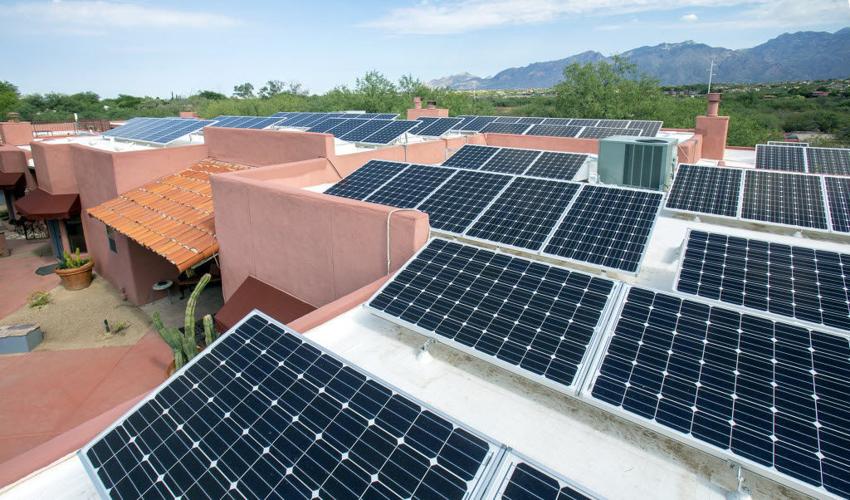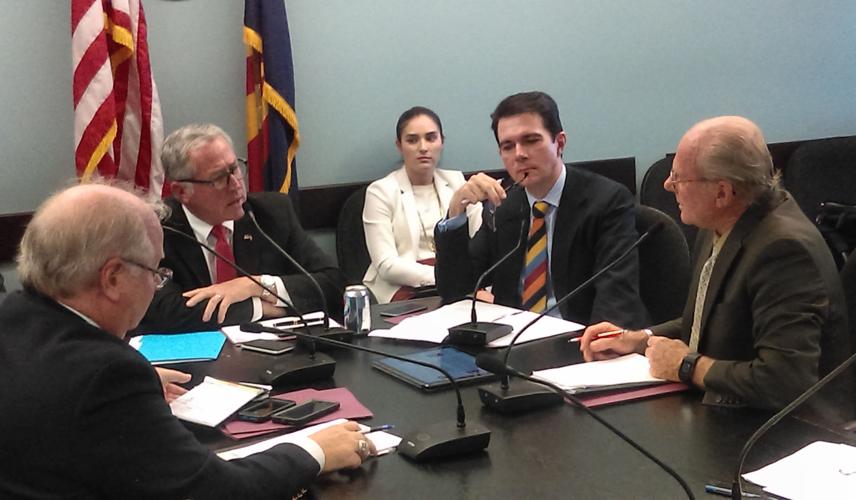If the pattern holds, the 2018 race for Arizona Corporation Commission will be about who was trying to influence this year’s race.
That’s because this year’s campaign is all about the last one, in 2014. And this year, it’s different players who are spending big money to try to stack the commission in their favor.
Two Democratic challengers and a Republican incumbent are pushing to take a majority of seats on the five-member commission. If they win, they’ll undoubtedly use their votes to force the state’s biggest electric utility, Arizona Public Service, to disclose all its past spending and efforts to stack the commission in their favor.
You may recall that two dark-money groups spent $3.2 million in 2014 to help elect Republicans Tom Forese and Doug Little and defeat their pro-rooftop-solar opponents. Where did they get their money from? Probably Arizona Public Service.
The commission has the power to force APS to disclose whether it donated that money, something APS has not denied. But the current membership of the commission hasn’t really shown the will. Republican Bob Burns, who is running for re-election, has singlehandedly issued subpoenas to APS and could use a couple of friendly commissioners to join him if they really want to force the company’s hand.
“I’m very concerned about the integrity of the commission and the potential undue influence of the utility if they are allowed to continue to contribute in secret,” Burns told me Friday. “They have the right to contribute, but they need to report at the time they spend.”
The two Democrats, Tom Chabin and Bill Mundell, are eager to join him in chasing down APS, which has resisted Burns’ subpoena with an argument that it is legally permitted to contribute anonymously.
“That’s the question: Where are the three votes to open up the books at APS?” Chabin asked at the candidates’ debate Oct. 11. “This commission needs to establish a rule that is clear: If you are a government-created monopoly, you must reveal every single political contribution.”
That seems like a simple declaration, but it contains more than it seems.
That’s because there are others playing in this year’s campaign whose business in Arizona could succeed or fail depending on who wins the three seats on the commission.
Notice the difference in how incumbent Andy Tobin, appointed earlier this year by Gov. Doug Ducey, phrased his position at that debate: “I came out from the very beginning and said anybody who is regulated or unregulated, anyone with business at the commission, they shouldn’t be spending any money” on commission campaigns.
Tobin’s phrasing includes the rooftop solar industry, led by solar-panel leasing company Solar City, which has also contributed millions to political campaigns for the commission, including this and past years.
Save Our AZ Solar, which is supported by Solar City, spent $688,642 supporting Burns in August and September. On Oct. 12, it reported spending $532,580 more in favor of him and Democrat Mundell. All of that money has been disclosed so far, but Solar City has also acknowledged supporting a dark-money group, the Checks and Balances Project, that tried to tie outgoing commissioner Bob Stump to utility interests.
“I think it’s great that they’re disclosing it,” said utility consultant and lobbyist Paul Walker. “But I don’t think the voters necessarily understand that when you look at net metering, demand charges, that those decisions will affect the business future of those (solar) companies in Arizona, just as much as the regulated utilities.”
The difference between the solar firms and the utilities is that the utilities are state-created monopolies. If you want electricity in their service area, you must become a customer of theirs. In return they are regulated by the commission — even their profits are determined in advance as part of a rate case. That’s what makes influencing the commission’s decisions so crucial.
A 1 percentage point shift in the “return on equity” the commission allows for a utility like Tucson Electric Power can mean a $16 million difference in profits. For APS, that shift would make a $50 million difference.
When the commission imposes changes that the utilities want — increasing the cost of rooftop solar via demand charges, net-metering changes and the like — that too helps the utilities and hurts the solar firms.
It would seem a simple solution to treat the rooftop solar companies more like utilities to even out their treatment. But that’s been attempted and failed.
In 2009-2010, the commission considered regulating Solar City as a public service corporation like a utility. The staff and an administrative law judge recommended that the commission do so, but the commission’s members decided not to. At the time, the commission was chaired by Kris Mayes. She, in turn, now runs Save Our AZ Solar, which still has more money to spend on this year’s race.
So, it’s tempting to vote in the reformers who will take on APS frontally and force them to reveal their contributions, and I plan to do so. I think the CEO of APS, Don Brandt, who made more than $9 million in total compensation last year, has earned that sort of inquisition by spending ratepayers’ money to try to buy his own regulators.
But I won’t be surprised if we’re looking for a new sort of reformers, ones who dig into the financial influence of the rooftop-solar companies, in 2018.






